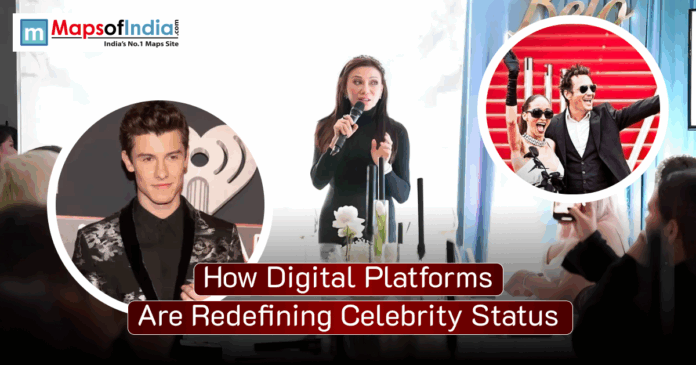Fame, influence and public recognition have always been associated with the notion of celeb. In the past, to reach the level of celebrity status, one had to be starring in movies, TV, radio, or print. But in the digital era, the principles of fame are changing at a very high rate. The social media network, the streaming network, and the digital content network have established a new ecosystem, resulting in anyone with talent, imagination, or relatability becoming a star, usually overnight. This is changing the definition of being a celebrity.
The Rise of Social Media Stars
Instagram, TikTok, YouTube, and Twitter have provided an equal playing field to the future influencers and creators. In comparison to classical celebrities, who usually depend on a studio, record label, or talent company, social media stars can build a fanbase without any assistance. They communicate with their fans, take comments and reveal their personalities, other than the refined personalities they show in public. This is an individual aspect that makes them intimate and relatable, leaving conventional celebrity fame without such.
Indicatively, micro-influencers (creators who own smaller, niche audiences) can have more engaged audiences than mainstream celebrities. The use of these digital personalities as the key to marketing is becoming more accepted by brands and advertisers, and the success of social media fame as a viable career choice.
Redefining Influence
Awards, box office achievements, and magazine covers alone are no longer the determinants of celebrity status. Power- the capacity to influence opinion, trends, and behaviours has become a major issue. Through social media, people have been able to influence the world’s discourses, promote social agendas, and bring new trends to the world instantly. Digital platforms are amplifying the voices that would otherwise not be heard in the conventional media, so that ordinary people are becoming influencers in their community or their industry.
This celebrity democratization by fame also alters the celebrity hierarchy. A social media creator who has millions of loyal fans is able to compete with traditional movie stars regarding reach and influence, and the boundaries between traditional and digital fame are becoming unclear.
The Role of Content Virality
Virality is significant to the redefining of celebrity. TikTok and Instagram Reels are applications that imply that it is possible to share short, shareable content and spread it among millions of people overnight. A viral video can elevate an individual who has never heard of a household name in a few days without the traditional gatekeepers. This has increased the number of overnight celebrities who are celebrities who have become famous because of their creativity, humour, talent, or relatability and not because of years of formal training and industry contacts.
Digital celebrity is also a transient phenomenon since the viral content is short-lived. Online stardom is not permanent, as traditional fame is, which is usually built over time. It is a vibrant world that requires the creators to continue being inventive and entertaining the audience to be in touch with the times.
Monetizing Digital Fame
Fame has become a viable profession because of digital platforms. The social media influencers are making a living on brand partnerships, sponsored content, ad revenue, merchandise, or fans. The monetization systems of sites like YouTube, Patreon, and TikTok enable their users to receive income directly from their followers; thus, notoriety is not simply figurative: it can be an economic possibility.
Digital creators can spread their sources of income; in contrast to their traditional counterparts, one or several projects or endorsements are typically the key to their financial income. This diversity is very attractive to various types of individuals, including game and lifestyle vloggers, teachers and activists and broadens the scope of who a celebrity can be.
The Global Reach of Digital Fame
The globalization of celebrity is one of the most significant shifts in digital platforms. Audiovisual materials that are posted online can be accessed in other continents within minutes. In a small town, a creator can gain worldwide fame, and geographic barriers to fame are broken. This cross-cultural interaction and this ability to affect fads across the globe enabled the celebrities to impact not only fashion and music, but also activism and lifestyle.
Besides, such global publicity can also bear the consequences of a hybrid kind of celebrity, as the person combines various cultural influences in their work. These online celebrities are defining a new, digitalized world of fame that breaks the boundaries of countries and the conventional media ethics.
Challenges and Responsibilities
Although digital platforms democratize fame, they are also a problem. The online celebrities are being subjected to scrutiny and criticism at a rate never before witnessed, as it is under their microscope. The need to be kept up to date and produce frequent content, and reach the target crowds can be mentally and emotionally straining. Also, misinformation, internet harassment and privacy issues are major dangers to the people who maneuver in the digital stardom.
Producers have to balance between authenticity and strategy, pay close attention to their personal brand, and think about the long-term effects of their digital presence. The burden of being a famous person is as critical as the accessibility to fame.
Conclusion
The concept of being a celebrity has been transformed by the digital platform. Previously popular indications of fame, including stars in movies or on magazine covers, are no longer the only avenues to fame. Influence, relatability and ability to connect with people in cyberspace are features of modern stardom. Creating social media content and allowing it to go viral and access the internet globally has democratized the process of becoming a celebrity, and everybody can become one with a dose of creativity and resolution. Nevertheless, even this new terrain is very tricky to walk through, because the pressure and the obligation of digital notoriety are inimitable. Further into the digital age, the concept of celebrity will continue to change as the technology, culture and human connection dynamically interact.





